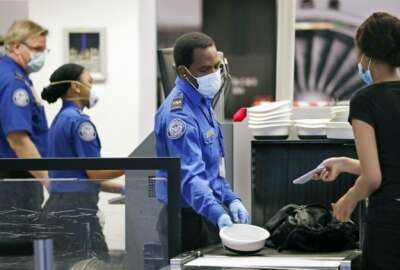 Exclusive
Exclusive Congressman wonders when DHS frontline employees will get vaccinated
In today's Federal Newscast, House Homeland Security Committee Ranking Member John Katko (R-N.Y.) wants to know what the plan is for vaccinating frontline DHS...
To listen to the Federal Newscast on your phone or mobile device, subscribe in PodcastOne or Apple Podcasts. The best listening experience on desktop can be found using Chrome, Firefox or Safari.
- House Homeland Security Committee Ranking Member John Katko (R-N.Y.) wants to know what the plan is for vaccinating frontline DHS employees. He’s concerned the department may prioritize vaccinating those in DHS custody over employees at the Transportation Security Administration, Secret Service, Customs and Border Protection and other subcomponents. CBP and Immigrations and Customs Enforcement are tracking over 7,000 cases of COVID-19 among their officers.
- Defense Secretary Lloyd Austin is telling military leaders to take the next 60 days to address political extremism. Austin met with each of the service chiefs and top civilian officials yesterday, partly because of concerns that some active duty members and veterans took part in last month’s insurrection at the Capitol. DoD said it’s still developing the training materials it’ll use during the two-month stand-down. Defense officials said they’ll also need to develop clearer definitions around what constitutes extremist activity. (Federal News Network)
- The Navy is making a concentrated effort to improve race relations and inclusivity in its ranks. The Navy will work on implementing about 60 new recommendations to make the service more accessible and open to minorities. The service asked a task force to look into race issues after George Floyd’s death last summer. The suggestions include strengthening outreach to underrepresented communities, continuing listening sessions, creating a special assistant for diversity and developing STEM programs. The Navy will also add respect to its core values and establish a student exchange program with the Naval Academy and Historically Black Colleges and Universities.
- A bipartisan duo of senators are introducing a bill to keep military retirees from losing healthcare. The legislation would extend the period retirees have to renew their TRICARE coverage. The time period would move from June to the end of 2021. Starting this year TRICARE Select members have six months to establish a payment plan for healthcare. Those who do not create a payment plan will lose coverage.
- A group of Senators are asking the National Security Agency for an update on a recent supply chain hack. No, not SolarWinds — the Juniper Networks breach five years ago. In a letter to NSA director Gen. Paul Nakasone, the senators ask for more information on the steps the agency took to secure defense networks. Juniper Networks announced its routers and firewalls had been hacked in 2015. Since then, there has been no official assessment of who was behind it and what sensitive data was exposed.
- A group of high level executives urged the Biden administration to help revamp how the nation responds to emergencies like the pandemic. A commission chartered by Business Executives for National Security said the National Response Framework, which dates to 2008, has been pressure tested by the pandemic and found to have gaps, including supply chain management. The commission has a long list of recommendations, including more clearly defined federal and state response roles, more frequent response exercises, and widening the statutory definition of disasters to include pandemics and cyber attacks.
- House and Senate lawmakers want the Postal Service to play an active role in the fight against COVID-19. In a letter to President Joe Biden, Senators Bernie Sanders (D-Vt.) and Brian Schatz (D-Hawaii) joined Congressmen Adam Schiff (D-Calif.) and Ro Khanna (D-Calif.) in proposing USPS distribute medical-grade masks to the public. While the lawmakers applaud Biden’s executive order mandating masks in federal buildings, they said distributing high-quality masks could make transmission far less likely.
- A government watchdog added federal workforce safety to its list of top pandemic challenges. The Pandemic Response Accountability Committee said clear communication from agency leaders is the best way to reduce COVID-19 transmission among the federal workforce. The PRAC also recommended agencies create work neighborhoods within a facility to reduce exposure between employees. Agencies should also issue COVID-19 information to staff in a centralized manner. The PRAC said a future report will review compliance of President Joe Biden’s executive order mandating masks in federal buildings.
- President Biden dismissed all 10 members of an obscure but powerful panel that handles labor disputes that involve federal agencies. A spokesperson with the Federal Labor Relations Authority said eight panel members resigned Tuesday. The remaining two were fired. Employee unions have criticized the Federal Service Impasses Panel for the last four years. They said the members rubber-stamped decisions they believe were more favorable to the agencies. It’s up to Biden now to name new members to the impasse panel. The appointees don’t require Senate confirmation.
- IBM has named a new head of its federal business. Steve LaFleche is the new general manager for the U.S. Public and Federal Market, taking over from Jay Bellissimo, who left in January to join Vonage as its chief operating officer. LaFleche comes to the new role after spending the last three-plus years as IBM’s managing director for the State of New York. He has been with Big Blue for 33 years and has held multiple positions, including vice president of the U.S. Public Sector for North America. (Federal News Network)
- 12 industry groups press Congress for more money for IT modernization. As Congress gets down to business in deciding the funding for the next pandemic relief bill, industry is making a push for lawmakers to fully fund the Biden administration’s request of $9 billion for the Technology Modernization Fund. A dozen industry associations sent a letter to House and Senate leadership yesterday trying once again to make a case for the increase in IT modernization funds. They said the TMF could be used for much-needed updates to critical systems to serve the public and to reduce cybersecurity vulnerabilities. The associations also want Congress to mostly relieve the requirement for agencies to have to pay back any TMF funds they receive.
Copyright © 2025 Federal News Network. All rights reserved. This website is not intended for users located within the European Economic Area.
Eric White
Eric White is news anchor and Federal Drive producer at Federal News Network.
Follow @FEDERALNEWSCAST
Related Stories
Related Topics
All News
Congress
Covid-19
Customs and Border Protection
Department of Homeland Security
Federal Drive
Federal Newscast
House Homeland Security Committee
Immigration and Customs Enforcement
John Katko
National & World Headlines
Secret Service
Tom Temin
Transportation Security Administration
Workforce




